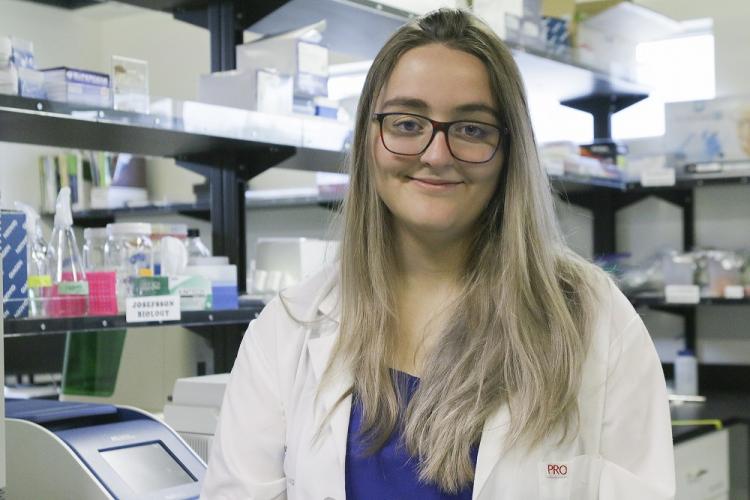The Vancouver Island marmot is one of Canada's most endangered mammals and a captive breeding program was started in the late 1990s to help prevent extinction. With such a small population, however, conservationists were concerned about the genetic diversity of the species.

Kimberley Barrett recently had her research paper published in the journal Conservation Genetics.
Credit: Vancouver Island University
Genetic diversity is crucial for the Vancouver Island marmot to survive threats such as disease outbreaks or adapt to climate change. A recent research paper led by Vancouver Island University (VIU) alum Kimberley Barrett is giving conservationists a better understanding of the genetic diversity of the Vancouver Island marmot.
Barrett's research, which was published in the journal Conservation Genetics, found that there's been no loss of diversity since the start of the captive breeding program and there is no difference in the genetics between the wild and captive populations, which means that diversity is being represented and preserved equally among both groups. It also demonstrates that current efforts to preserve the remaining amounts of genetic diversity have been successful so far.
"With captive breeding one of the foremost concerns on the mind of conservationists is genetic diversity because if that happens, we can see a lot of negative ramifications for that species, especially long-term," says Barrett, adding that Vancouver Island marmots already have a low level of genetic diversity because they are a species only found on the Island and their numbers had previously declined to the brink of extinction.
The Vancouver Island marmot reached its lowest point in 2003 with less than 30 marmots remaining in the wild and since that time more than 530 captive-born pups have been released back in the wild.
Dr. Jamie Gorrell, a VIU Biology Professor and Barrett's VIU research supervisor, says that if a species loses genetic diversity, it may be harder to cope with threats later on.
"There's the risk that low diversity means you may not be able to survive new threats like disease and even if you can survive now, you may not be able to adapt tomorrow," says Gorrell. "Climate change is a big one. We don't necessarily know how marmots are going to respond to it. Temperatures are getting more variable and the consistency year-to-year is getting less reliable. We expect it's going to be harder for marmots to cope with that in the future."
Barrett graduated from VIU with a Bachelor of Science in Biology in 2019 and is currently pursuing her Master of Science at the University of Alberta. The paper is based on research she conducted as an undergraduate student at VIU, part of her fourth-year independent research project for Biology 491. It involved sequencing DNA from marmot hair samples supplied by the Vancouver Island Marmot Recovery Foundation.
"Kind of CSI style we extracted the DNA from those samples and sequenced those marmots' DNA," says Barrett. "With that information we were able to check in on the marmots from a genetic perspective to see if there have been changes in their genetic diversity since the collapse of their population in the early 2000s."
Barrett received a VIU REACH Award, an award given to students to conduct an independent project, and an Undergraduate Student Research Award from the Natural Sciences and Engineering Research Council of Canada (NSERC) to pursue her research.
While Barrett is the lead author on the research paper it has eight other co-authors including VIU alum Genevieve Amaral and Melanie Elphinstone, who conducted some of the research while they studied at VIU. The work was completed under the mentorship of Gorrell in collaboration with the Marmot Recover Foundation. It was partially funded by Gorrell's NSERC Discovery Grant.
Check out the research paper titled "Genetic management on the brink of extinction: sequencing microsatellites does not improve estimates of inbreeding in wild and captive Vancouver Island marmots (Marmota vancouverensis)" on the Conservation Genetics website.










